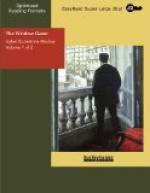“Come, come!” chided the assistant still more delightfully. “We mustn’t be shy! Bessie, let us hear from you. ‘As Moses—’”
“As Moses.”
“Very good. Now, Eddie. ‘Lifted up.’”
“Lifted up.”
“Very good indeed. Mabel, you next. ‘The ser-’”
“I’m scared of snakes,” said Mabel unexpectedly.
“Well, well! But you are not afraid of snakes in Sunday School.”
“I’m s-cared of snakes anywhere!” wailed Mabel.
“Oh, there is the first bell—excuse me.” The relief of the assistant was a joyful thing. “That means that you have three minutes more, Mrs. Spence. We usually utilize these last moments for driving home the main thought of the lesson. Very important, of course, to leave some concrete idea—sorry, I must hurry.”
Desire felt that she must hurry, too. She hadn’t even time to wonder what a concrete idea might be. One can’t wonder about anything in three minutes.
“Children,” she began. “We haven’t learned much about Moses. But the main idea of this lesson is that he was a very good man and a great patriot. He had been brought up in a King’s palace, yet when the time came for him to choose, he left the beautiful home of the mother who had adopted him and went to his own people. His Own People,” she repeated slowly. “Do you understand that?” The class sat stolidly silent. Desire’s eye rested again upon the little girl with the prim mouth.
“Ma says ’dopting anyone’s a terrible risk,” said the prim one. “Like as not they’ll never say thank yuh.” . . .
CHAPTER XXIII
“And that,” said Desire later in the day as she related her experiences to the professor, “that was the idea with which I left them! I shan’t have to teach again, shall I, Benis?”
Her husband smiled. “No. I should think more would be a superfluity.”
“They’ll say I’m a heathen. I know they will. You don’t realize how serious it is. Think how your prestige will suffer.”
“It has suffered already. Only yesterday Mrs. Walkem, the laundress, told Aunt that your—er—peculiarities were a judgment on me for ‘tryin’ to find out them things in folkses minds which God has hid away a-purpose.’”
“But I’m in earnest, Benis—more or less.”
“Let it be less, then. My dear girl, you don’t really think that Bainbridge disturbs me?”
“N-no. But it disturbs me. A little. I am so different from all these people, your friends. And being different is rather—lonely.”
“It is,” he agreed. “But it is also stimulating.”
“I used to think,” she went on, following her own thought, “that I was different because my life was different. I thought that if I could ever live with people, just as we live here, with everything normal and everyday, the strangeness would drop away. But it hasn’t. I am still outside.”




